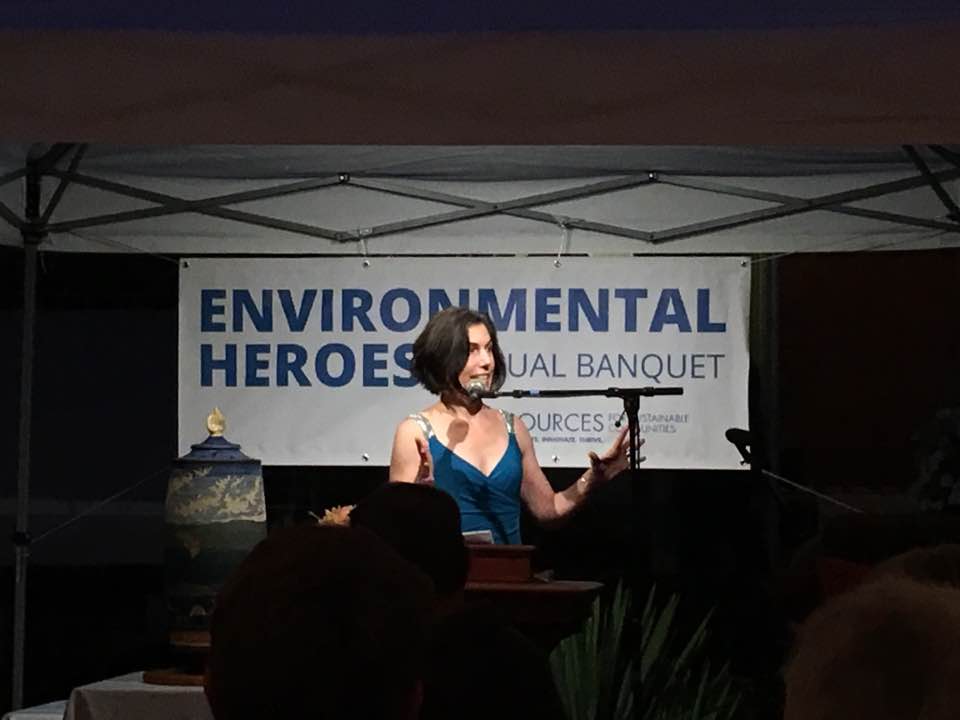I was a featured speaker, along with Darrell Hillaire and Matt Krogh, at this year’s Environmental Heroes Banquet in Bellingham. The Heroes honored this year were the Communities and Peoples of the Salish Sea, for our collective efforts in stopping North America’s largest coal port from being built at Xwe’chi’eXen/Cherry Point. My speech, Apocalypse Escape Plan, is here, in abridged form:
“This year, the ReSources Environmental Heroes Award was given to the Community and Peoples of the Salish Sea for our collective efforts against the proposed coal port at Xwe’chi’eXen/Cherry Point. I’m delighted to be part of this community, to stand on Coast Salish ground, to call this place home.As the story of our collective efforts cannot be told by any one person, I want to tell part of my story in hopes that you might do the same.Mine begins years ago, when I was growing up in Bellingham. It was the 1980’s, and the threat of nuclear attack from Russia hung over us. So I came up with an apocalypse escape plan.I have always loved to be on the water, and as a girl, I had a little green sailboat, single mast. My plan was that, in the event of war, I would load up my little boat and sail out into the Salish Sea. Somehow, the islands and the waters would provide refuge, sanctuary. The Salish Sea would allow me to escape, or survive, the nuclear apocalypse.But that apocalypse didn’t happen. The 80’s passed, I moved away from the Salish Sea, and then, some years ago, I came back.I came back, became a mother, and started again worrying about the apocalypse. This time the apocalypse I feared was not nuclear war, but climate change. I would wake from nightmares about drought and heat and war and havoc, scenes of the world gone haywire.This happened right around the time that word about the proposed GPT coal port got out. The proposed coal port posed a direct threat to my sanctuary, my refuge, the Salish Sea. My raging maternal hormones reacted to this news with a huge NO. My NO was emotionally violent, survivalist, irrational. It was the no of a mother defending her infant. I was enraged.That rage motivated me to become involved. As I did so, I saw that friends and neighbors and people all around me were doing the exactly the same.Each of us came with our personal motivations. Each of us played to our strengths. To a remarkable degree, egos were set aside in favor of common cause. We all communicated regularly, respected one another’s positions and contributions, and we acted strategically.Citizens showed up.We fought to protect treaty rights, sacred lands, shared lands, shared air, shared waters. We fought for the killer whales and the salmon and the crows and the cedar trees. We fought for ourselves, our friends, our family, our neighbors, we fought for our our elders, our ancestors, our children, our children’s children.In fighting for this place, we defined ourselves and our commonly held values. We care ferociously. We care about one another, we care about this place, and all that lives here. We care about the history of this place, the spirit and culture and beauty of this place.In fighting with this community and for this place, I began to see how various communities and places are all connected. Our struggle is connected to those of Keystone, of the Arctic, of Nigeria and Venezuela and Yemen and the Alberta tar sands, of Standing Rock. The fossil fuel infrastructure connects us, the struggle against catastrophic global warming connects us, the working towards a dream of a safe, healthy, vibrant and living home connects us.As a community we were given a deeply meaningful fight. We were given the opportunity to simultaneously work for the Salish Sea and work against climate change. We made friends, we got to know our neighbors, we continued to learn who we are as a community.All around the world, there are ancient tales and sacred stories of floods. Often in these stories, there is warning that goes largely unheeded. A flood comes and wipes out civilization, only a few survive. Refuge is taken in a boat. An ark, a small sailboat, a canoe.The flood is coming. The glaciers are melting more rapidly than we thought they would, the ocean currents are changing, hurricanes are raging. The seas are rising. The flood of myth, the world-consuming flood, is coming.And yet, I no longer have apocalypse nightmares. I no longer wake in the middle of the night afraid of the world that we will leave to my child, to all of our children. Climate change is upon us, but we can still affect the degree of change, the type of change it will be. Our future could be apocalyptic, or it could be one of resilience, ingenuity, and beauty.Though the flood is coming, we have an apocalypse escape plan. We have an ark, a small sailboat, a canoe. That vessel is this community, it’s us, all of us, connected, working together, pulling together.”
